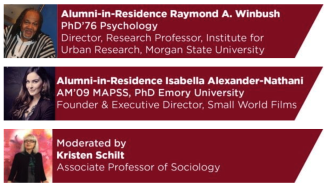2022-23: SSRC Year in Review

SSRC expanded activities in 2022–23, offering more support, programming, and resources across its five pillars of support and engagement.
Research Development
The research development team provides a full array of research development services to faculty in the Division of the Social Sciences, Harris School for Public Policy, and Crown Family School of Social Work, Policy, and Practice. In the last year, the team worked with nearly 100 faculty and directly assisted with more than 140 grant (internal and external, foundation and federal) and fellowship proposals and submissions.
Funding
SSRC's Faculty Seed Grant Program awarded $100,000 to seven research projects across the Division. The seed grant program, launched in 2017, has yielded $7M in external funding for research. SSRC also named three new graduate student fellows, who are working on innovative dissertation projects in SSRC space. Finally, SSRC coordinated several Divisional awards:
W. Allison Davis Graduate Research Award: A total of $25,000 was awarded to six doctoral students in the Anthropology, Sociology, and Crown Family School of Social Work, Policy, and Practice who are working on research related to Davis's focus on the effects of social stratification and segregation on family life, language use, educational attainment and the development of personality and character of children and adolescents in American minority groups.
Gedvila Family Research Award: A total of $5,000 was awarded to an MA student in MAPSS and a doctoral student in Linguistics for research focused on the history and culture of Lithuania, the Baltic States, and/or Eastern Europe.
Saller Dissertation Prize: A total of $5,000 was awarded to two students—one in Comparative Human Development and one in Sociology—to recognize the most outstanding dissertations of the year.
David R. and Mady W. Segal Fund for Social Sciences Research on Military Personnel: A total of $5,000 was awarded to one student in Anthropology and one in Sociology for dissertation research focused on military personnel or military organization.
Programming
During the 2022–23 academic year, SSRC organized 24 events that facilitated faculty networking on migration, climate change and clean energy, and the integration of computer science into social sciences research; provided training on data security, data use agreements, the IRB, and navigating risks when writing on politically sensitive topics; and shared insights into funding mechanisms, including introductions to NSF CAREER and DDRIG, as well as a virtual visit by NSF BCS staff.
Broader Impacts
SSRC offered programming that addresses broader impacts, with a Facilitating Thought Leadership initiative that supports faculty, postdocs, and doctoral students in sharing their research and analysis through op-eds. In the spring, we coordinated a How to Write an Op-Ed workshop for doctoral students and postdocs. Based on interest, we plan to offer another one in the fall.
SSRC supports the Division’s Alumni-in-Residence program, which connects students to accomplished alumni in a variety of industries and careers. This year, eight events ranging on topics from social scientists in filmmaking to women in leadership positions to data science for the public good, connected alumni with students, teaching fellows, and postdocs.
Shared Space
Ten faculty members housed research teams and operations in SSRC for a diverse array of research projects—supported by more than $9.3M in active grant funds from federal and private funding agencies.
 THE UNIVERSITY OF CHICAGO
THE UNIVERSITY OF CHICAGO


